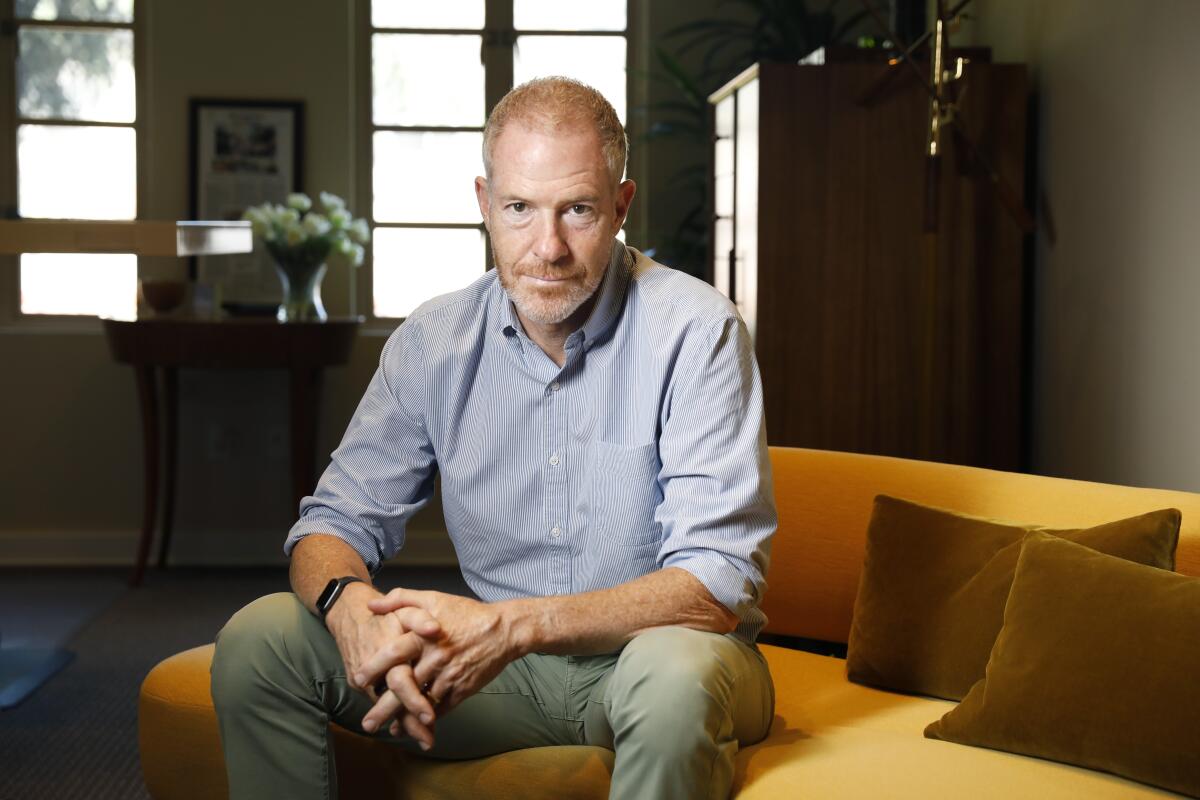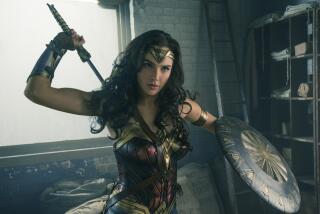Theaters or HBO Max? Warner Bros. movie plans take shape as Discovery merger looms
- Share via
On Dec. 3, Warner Bros. — the 98-year-old studio known for such gems as “Casablanca” and “The Dark Knight” — stunned Hollywood by announcing its entire 2021 film lineup would be available on HBO Max and in theaters on the same day in the U.S., where theaters were hobbled by the coronavirus.
Many people in the industry, as well as Warner Bros. insiders, worried that a studio that had made talent relationships its signature for decades had lost its way.
After three years of upheaval under owner AT&T, Warner Bros. is confronting another industry-changing shakeup. Just weeks ago, the studio learned it would be merged with Discovery, home of HGTV, Food Network and Animal Planet.
But as the $43-billion Discovery merger ambles toward regulatory approval next year, Warner Bros.’ risky release strategy, internally dubbed “Project Popcorn,” appears to be working. Movies such as “Godzilla vs. Kong” and “The Conjuring: The Devil Made Me Do It” have done better than expected at the box office and brought millions of subscribers to HBO Max, according to executives.

“I’m both happy and relieved, because it has ultimately played out almost exactly as we hoped it would,” said Carolyn Blackwood, chief operating officer of Warner Bros. Pictures Group. “We’ve got filmmakers and talent who are now happy, we’ve got exhibitors that are happy, we’ve got audiences that are happy, and our partners at HBO Max are thrilled.”
Despite skepticism, Warner Bros. leaders had long insisted that same-day releases were a pandemic special — a 2021-only solution to the problem of COVID-19 shutting down cinemas.
Although the future of Warner Bros. under Discovery remains unclear, the studio’s strategy for next year and beyond is coming into focus. After this year, the Burbank studio will go with a half-and-half approach to its schedule, executives said. Of the roughly 20 movies Warner Bros. makes annually in the coming years, 10 to 12 will be designated specifically for HBO Max. The other 10 to 12 will launch in theaters exclusively for at least 45 days before they’re available for home viewing.
Warner Bros. Pictures Group Chairman Toby Emmerich said, “What we’re really excited about is, when HBO Max is a big, robust global platform — which will happen — we will have first-class direct-to-consumer as well as worldwide theatrical capability, and I think that’s an advantage.”
Inside the business of entertainment
The Wide Shot brings you news, analysis and insights on everything from streaming wars to production — and what it all means for the future.
You may occasionally receive promotional content from the Los Angeles Times.
The studio’s 2022 theatrical film lineup features five DC movies: “The Batman” with Robert Pattinson, “Black Adam” starring Dwayne Johnson, “The Flash” with Ezra Miller, the animated feature “DC Super Pets” and James Wan’s “Aquaman 2.”
“This movie has to be played on the biggest screen around the world, and the studio gets that as well,” said Wan, who directed two “Conjuring” horror films with the studio.
The next “Fantastic Beasts” film, Baz Luhrmann’s “Elvis” and the Olivia Wilde-directed thriller “Don’t Worry Darling” are also headed to theaters next year.
For HBO Max, Steven Soderbergh recently wrapped shooting on his feature “Kimi,” starring Zoë Kravitz. Also on the docket: a Latinx re-imagining of “Father of the Bride” starring Andy Garcia and a “House Party” reboot from LeBron James’ production company Spring Hill Entertainment. Additionally, Warner Bros. has mid-budget DC movies on the way for streaming, “Batgirl” and “Blue Beetle.”
The tilt toward streaming represents a significant departure from pre-pandemic norms. HBO Max, which had a rocky start when it debuted in May 2020, needs content to convince subscribers to pay $15 a month as it competes head-on with Netflix, Disney+, Amazon Prime Video and others.
Netflix is releasing at least one movie a week. Amazon is buying MGM Studios for $8.5 billion, largely for its film library. Universal recently moved its “Boss Baby” sequel to parent company Comcast’s streaming service, Peacock. Disney is releasing Pixar’s “Luca” directly to Disney+ and selling Marvel’s “Black Widow” on the app for $30.
Warner Bros. is making its entire 2021 slate of movies available for streaming on HBO Max as soon as they hit theaters. Critics say the studio is being “dismantled.”
“When streamers were starting ... the common wisdom was, ‘series drive subscription; movies reduce churn,’” Emmerich said. “Movies weren’t really the drivers of getting people to sign on. And I think now, the perception with film on these streaming services is that they’re punching above their weight in sign-ups.”
Indeed, movies have been crucial to the growth of HBO Max. COVID-19 slowed production, and Warner Bros. had a lineup of movies with combined budgets of $1.5 billion sitting on the shelf.
WarnerMedia has not said how many subscribers have viewed the films online. HBO and HBO Max now have 44.2 million subscribers combined, up from 38 million in September 2020.
Andy Forssell, head of HBO Max, said the new movies have helped the service acquire subscribers, reduce churn and drive viewers to other content on HBO Max, like “The Nevers.” Of the people who signed up to watch “Wonder Woman 1984” in December and didn’t cancel, about two thirds watched the Denzel Washington movie “The Little Things,” which debuted in January, he said.
“These films have been very helpful in acquisition and more helpful in retention than we ever could have seen or hoped,” Forssell said.
The films have also injected much-needed life into the box office. Though “Wonder Woman 1984” posted modest results domestically in December, “Godzilla vs. Kong” grossed $99 million in the U.S. and Canada, while family film “Tom & Jerry” collected $45.9 million and the R-rated “Mortal Kombat” did $42 million. Last weekend’s “The Conjuring: The Devil Made Me Do It,” the latest in the popular spooky franchise, opened with a solid $24 million.
The strategy faces its latest test this weekend with “In the Heights,” Jon M. Chu’s adaptation of Lin-Manuel Miranda’s Broadway musical, which has earned enthusiastic reviews.
So far this year, Warner Bros. movies have accounted for more than 35% of the domestic box office, according to Comscore, helping struggling theater chains bring in patrons at a time when there were few big movies to play. The studio agreed to take a smaller cut of the box office it splits with theater chains, who were concerned that streaming movies would cannibalize ticket sales.
Warner Bros. executives said there are no plans to return to exclusive theatrical windows before 2022, despite the success of Paramount’s “A Quiet Place Part II,” which is not available for streaming and set a pandemic box office record.
“To their credit, they released a lot of movies, they supported the heck out of them with their marketing, they were flexible with their licensing terms and they committed to a 2022 slate with an exclusive window,” said Mark Zoradi, chief executive of Plano, Texas-based theater chain Cinemark. “For all those reasons, the relationship was repaired.”
Still, the announcement of the same-day release plan damaged talent relations. Top filmmakers Christopher Nolan (“Tenet”) and Denis Villeneuve (helming the upcoming Legendary and Warner Bros. release “Dune”) blasted the strategy, and the studio had to scramble to do damage control.
Resentment lingers among some top agents, though they largely blame AT&T. WarnerMedia CEO Jason Kilar, who will remain at least until the merger closes, acknowledged in a recent Wall Street Journal profile that creative partners could have been given more of a heads-up.
“There’s the Toby that I know that is super artist friendly and built a career on relationships, and then there’s the Toby that’s had to work for people that made him deliver just the opposite of artist-friendly news,” said Bryan Lourd of Creative Artists Agency. When asked if he thinks the company has made progress repairing those relationships, Lourd was blunt: “No, I don’t.” Lourd added that he expects things to improve under Discovery.
Said Emmerich: “The initial reaction of the town, we get it. But I think we’re in a better place now. Hopefully we’ve restored trust.”
Charles Roven, producer of “Wonder Woman 1984,” was pleased that Warner Bros. promised to return to theatrical windows for next year’s movies, even though his upcoming movie “The Suicide Squad” is still among the films going on HBO Max and theaters.
“Of course I’m going to say that I would obviously prefer it was just a theatrical window, because I think it’s one of the most anticipated movies of the year,” Roven said. “The good news is, they limited it to 2021.”
WarnerMedia’s plan for making movies for HBO Max has shifted over time. In early 2020, the company announced a mini-label called Warner Max, run by Emmerich and HBO Max’s Chief Content Officer Kevin Reilly, that would make films for the streaming service. Reilly was ousted in August, and Emmerich, a movie business veteran who’d run Warner Bros.’ New Line division for years, consolidated control over movies for the service.
The studio’s plan to make movies for HBO Max adds another layer to Emmerich’s green-light process. How do you decide what movies belong on the big screen and which ones are destined for streaming?
Why Lin-Manuel Miranda says Chu was right to direct “In the Heights” and the circuitous journey the “Crazy Rich Asians” helmer took to the musical remix.
“The Batman” and the next “Fantastic Beasts” film are obvious theatrical choices. With other genres, like thrillers and comedies, it’s not so straight forward, though some mid-budget fare will go to the big screen.
Those include Wilde’s “Don’t Worry Darling,” a psychological thriller starring Florence Pugh that was bid on by 18 studios before Warner Bros. secured it. Though the project wasn’t a big-budget visual effects bonanza and wasn’t based on any well-known existing intellectual property, executives pegged it as a theatrical release.
“For a filmmaker, you just want to work with people who love movies, and Toby Emmerich loves movies,” Wilde said. “I come in with a lot of enthusiasm and a lot of ideas, and he’s a great partner because he’s equally enthusiastic. ... Their enthusiasm for my ambition was really empowering.”
It’s still unclear what exactly Discovery’s plan is for Warner Bros. Discovery has said it expects $3 billion in annual synergies from the deal, which usually means layoffs. Warner Bros. under AT&T already suffered from job losses and belt-tightening, which diminished its reputation in the town.
WarnerMedia Studios and Networks head Ann Sarnoff said she was cheered by the recent town hall meeting with David Zaslav, at which the Discovery chief focused on Warner Bros.’ legacy of making film and TV shows.
“Everybody is excited about the enthusiasm that the Discovery folks have for all the heritage and success for WarnerMedia to date,” she said “It was great to feel David’s enthusiasm and passion for what we do.”
More to Read
Inside the business of entertainment
The Wide Shot brings you news, analysis and insights on everything from streaming wars to production — and what it all means for the future.
You may occasionally receive promotional content from the Los Angeles Times.












